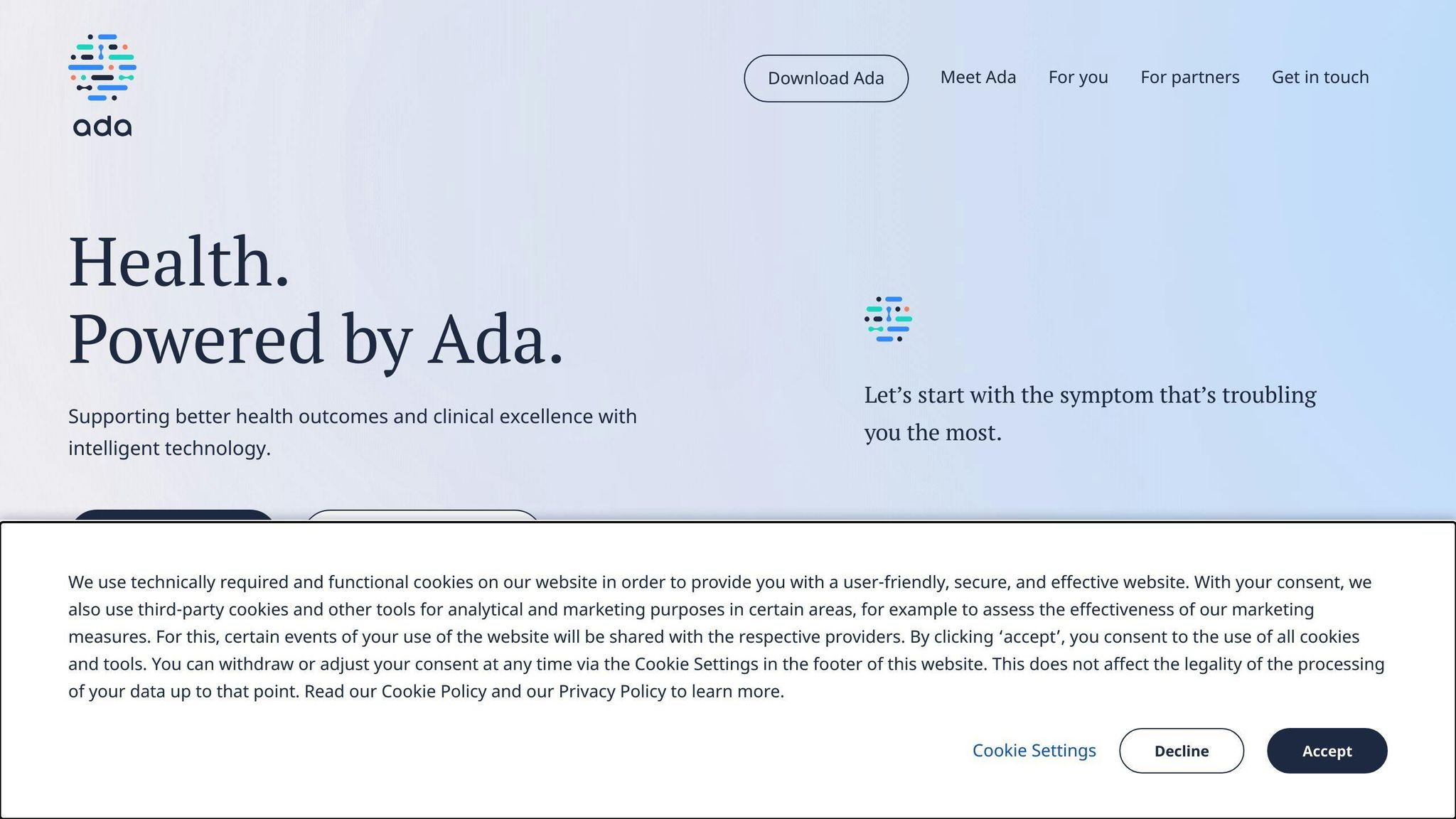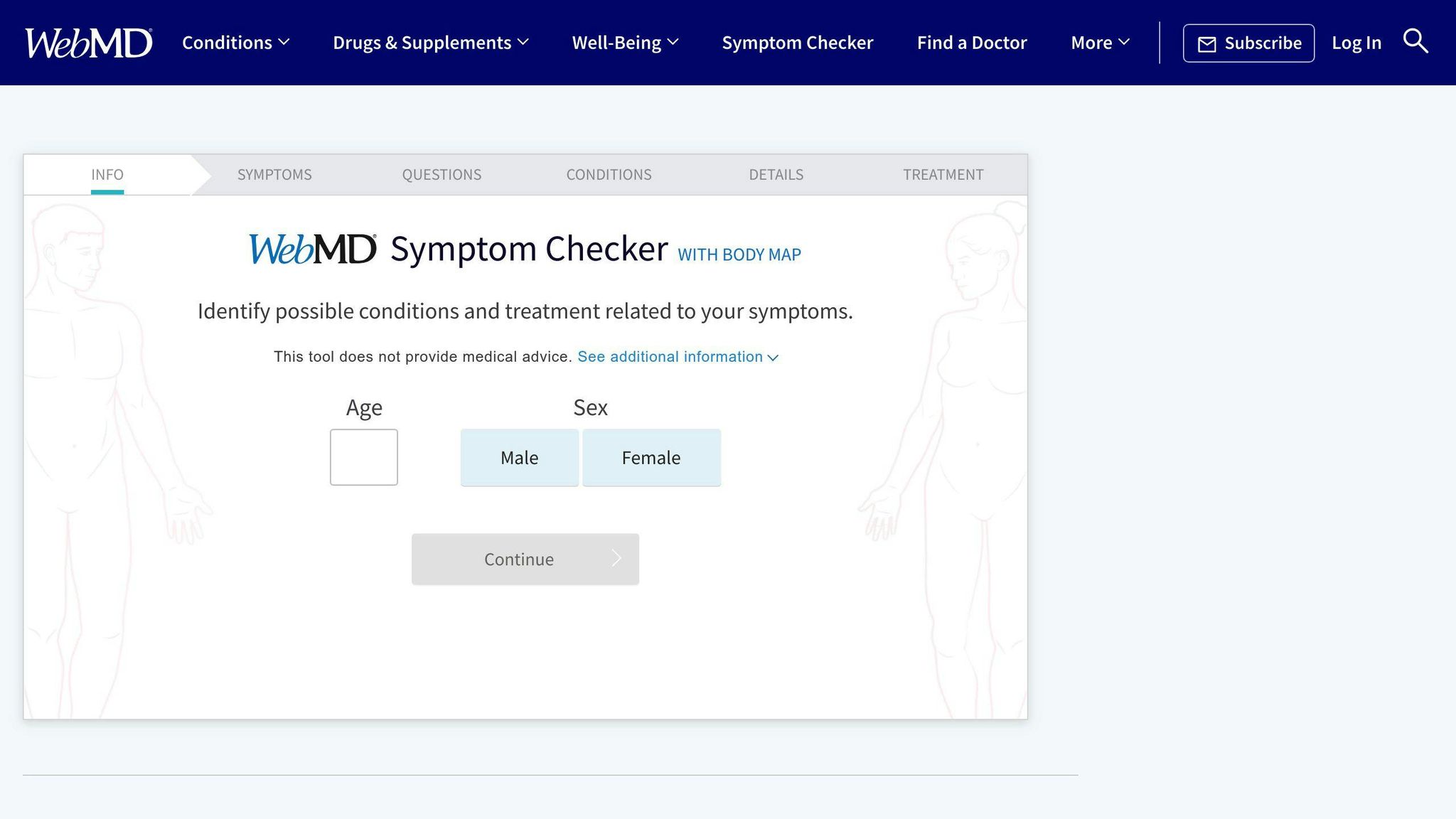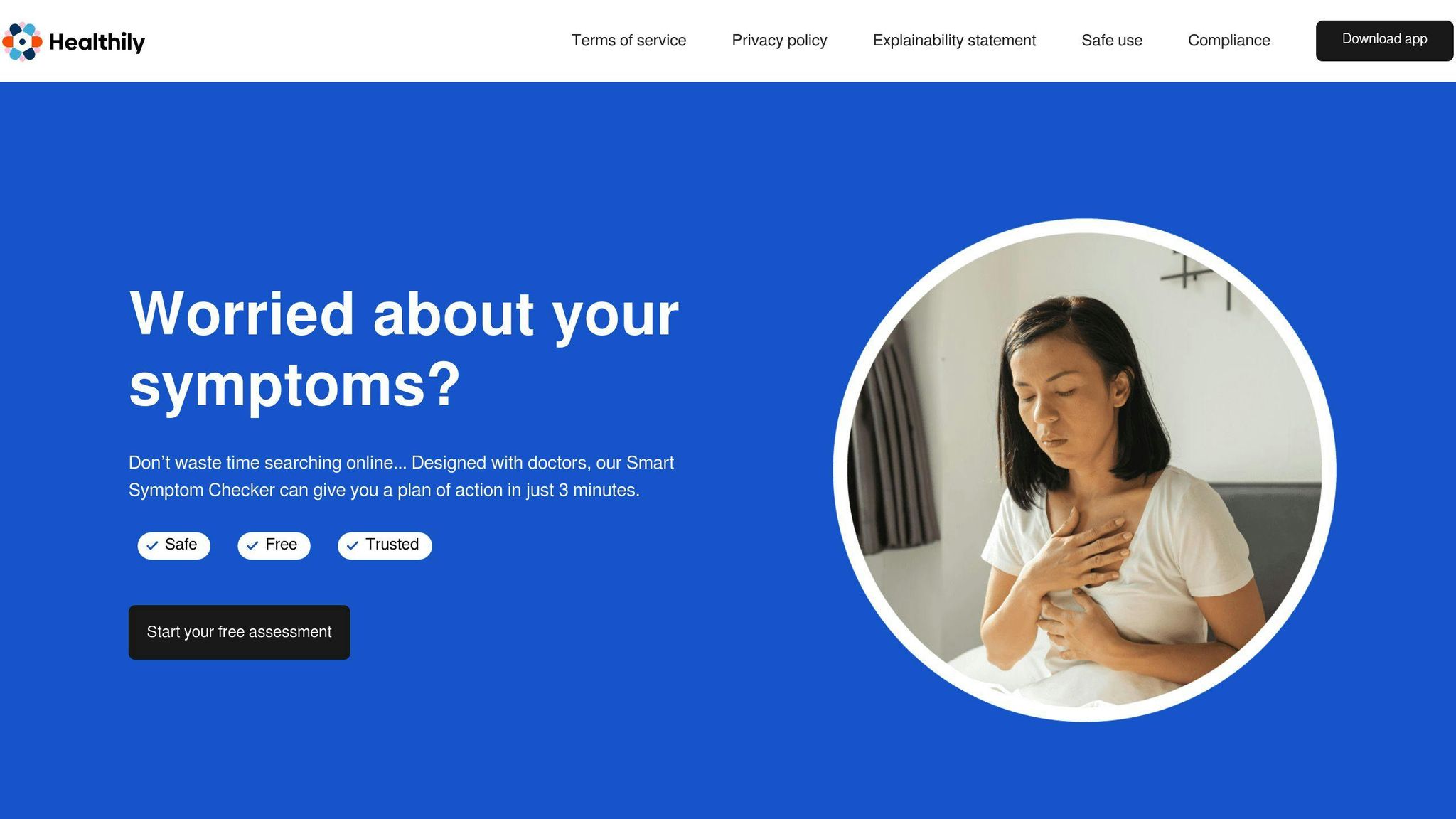
AI Symptom Checkers: Accuracy, Pros & Cons
Get the facts on AI symptom checkers before you use them. We tested accuracy rates and found when they help vs. when you need a real doctor.

Written by
Adam Stewart
Key Points
- Expect 60-62% accuracy - useful for guidance, not final diagnosis
- Ada beats WebMD by using your personal data, not general stats
- Save money on minor concerns, but see doctors for serious symptoms
- Input complete, accurate symptoms or risk getting wrong guidance
AI symptom checkers are online tools that analyze your symptoms and suggest potential health conditions. They aim to help detect issues early, reduce strain on healthcare systems, and improve patient outcomes. However, they have limitations and should not replace professional medical advice.
Key Benefits:
- Accurate diagnoses by analyzing vast medical data
- Convenient access from home
- Cost savings by reducing unnecessary doctor visits
- Personalized advice based on your details
Drawbacks:
- Limited medical knowledge compared to human doctors
- Risk of misdiagnosis from inaccurate user information
- Lack of human interaction and empathy
- Require internet access and compatible devices
| Popular AI Symptom Checkers | Key Features |
|---|---|
| Ada | - User-friendly app - Personalized results - Free service |
| WebMD | - Accurate diagnoses - Simple interface - One-page process |
| Healthily | - 61% accuracy rate - Tailored recommendations - Mobile app |
While AI symptom checkers offer benefits like convenience and personalized guidance, they have limitations. Use them responsibly as a complement to professional medical care, not a replacement.
Related video from YouTube
1. Ada

Easy to Use
The Ada Health app is a user-friendly tool for understanding potential health issues. It's currently the top-ranked medical app in over 130 countries, with around 45,000 cases entered daily. So far, about 6 million people have used Ada, suggesting it's a convenient and accessible option.
Accurate Results
Studies show that Ada provides more accurate results than other symptom checkers like WebMD. Instead of simply listing the most common causes based on general population data, Ada uses your specific symptoms and details to give personalized results.
Key Features
| Feature | Description |
|---|---|
| Free Service | You can enter your symptoms and get possible conditions at no cost. |
| Top Ranked | Ada is the highest-ranked medical app in over 130 countries. |
| Personalized | Results are tailored to your symptoms, medical history, and personal information. |
The Ada Health app offers an easy way to get accurate, personalized guidance on potential health issues. Its user-friendly design and free service make it a valuable resource.
2. WebMD

Accurate Diagnoses
In a review of symptom checkers, WebMD's tool was found to provide an accurate diagnosis in under a minute. It lists potential diagnoses with a likelihood indicator, making it easy for users to understand their possible health issues.
User-Friendly Interface
WebMD's symptom checker has a simple, intuitive interface. It features an anatomical human avatar for quick selection of the problem area. The symptom selection dropdown appears for the selected area, and the entire process occurs on one page. This streamlined design allows users to navigate and get results effortlessly.
Key Features
| Feature | Description |
|---|---|
| Accurate Diagnoses | Provides accurate diagnoses quickly. |
| Simple Interface | Easy-to-use interface with an anatomical avatar. |
| One-Page Process | Users can get results without navigating multiple pages. |
WebMD's symptom checker is a reliable and user-friendly tool for understanding potential health issues. Its accurate diagnoses and straightforward interface make it a valuable resource for seeking medical information.
sbb-itb-93482ea
3. Healthily

Healthily is a popular online symptom checker. A study looked at how accurate it is:
Accuracy Rate
- The study found that Healthily matched the recommendations of the Royal College of General Practitioners (RCGP) 62% of the time.
- Overall, Healthily suggested the correct condition in 61% of cases.
- While not the highest accuracy rate, it still shows Healthily performs reliably.
User Experience
- Healthily's symptom checker has a simple, easy-to-use interface.
- Users can quickly select their symptoms and get personalized recommendations and possible diagnoses.
- The tool is available as a mobile app, making it convenient to use on-the-go.
| Key Features | |
|---|---|
| Simple Interface | Allows quick symptom selection |
| Personalized Results | Provides tailored recommendations |
| Mobile App | Accessible on-the-go |
Pros and Cons of AI Symptom Checkers
AI symptom checkers offer some benefits but also have limitations. Here's a summary:
Benefits
- Accurate Diagnoses: AI tools can analyze vast medical data to provide accurate potential diagnoses, reducing misdiagnosis risk.
- Convenient Access: Online or mobile app access allows getting medical guidance from home.
- Cost Savings: Reducing unnecessary doctor visits and tests can lower healthcare costs.
- Personalized Advice: AI tools provide tailored recommendations based on individual user data.
Drawbacks
- Limited Knowledge: AI tools are only as knowledgeable as their training data, lacking the comprehensive medical expertise of human doctors.
- Misdiagnosis Risk: Inaccurate or incomplete user information can lead to incorrect diagnoses.
- No Human Interaction: AI tools lack the empathy and personal connection of a doctor-patient relationship.
- Technology Dependence: Stable internet and compatible devices are required to use AI symptom checkers.
| Benefits | Drawbacks |
|---|---|
| Accurate Diagnoses | Limited Knowledge |
| Convenient Access | Misdiagnosis Risk |
| Cost Savings | No Human Interaction |
| Personalized Advice | Technology Dependence |
While AI symptom checkers offer advantages, it's crucial to understand their limitations and use them responsibly, recognizing they are not a substitute for professional medical care.
Final Thoughts
AI Symptom Checkers: Helpful but Not a Replacement
AI symptom checkers can be useful tools, but they have limits. Here's a quick look at their pros and cons:
| Pros | Cons |
|---|---|
| Provide quick potential diagnoses | Limited medical knowledge |
| Easy to access from home | Risk of incorrect diagnoses |
| May reduce healthcare costs | No human interaction or empathy |
| Give personalized advice | Require internet and devices |
AI tools analyze data to suggest possible conditions. This can help detect issues early and guide next steps. However, they only know what's in their training data, lacking a doctor's full expertise.
Inaccurate user info can lead to misdiagnoses. And while convenient, AI lacks the personal touch of a doctor-patient relationship.
Using AI Symptom Checkers Wisely
AI symptom checkers have benefits but shouldn't replace professional care. Use them responsibly:
- Understand their limits
- Provide complete, accurate details
- View results as general guidance, not diagnosis
- See a doctor for serious symptoms or concerns
AI tools can be a helpful first step. But for quality healthcare, combine their use with guidance from qualified medical professionals.
FAQs
How accurate are symptom checkers?
Symptom checkers have varying levels of accuracy. Studies show that on average, they correctly identify the right diagnosis around 50% of the time when listing the top three results. However, some apps like Ada Health perform better, with an accuracy rate of around 70%. It's important to remember that symptom checkers are not a replacement for professional medical advice.
How do AI symptom checkers work?
AI symptom checkers gather information from you about your symptoms, medical history, and personal details. They then use AI technology to analyze this data and compare it to a database of medical knowledge. Based on this analysis, the app provides a list of possible conditions that could match your symptoms, often ranked by likelihood.
Can AI diagnose better than doctors?
In some cases, AI can provide more accurate and faster diagnoses than doctors for certain conditions. However, AI should not replace doctors entirely. Instead, it should work alongside healthcare professionals, enhancing their abilities. AI lacks the human touch and empathy that a doctor can provide, and its limitations should be recognized.
What diseases can AI detect?
AI can detect various illnesses, including:
- Cancer
- Cardiovascular diseases
- Alzheimer's
- Skin disorders
- Diabetic retinopathy
- Brain diseases
AI has wide applications in medical fields, enabling accurate prediction and detection of many health conditions.
Summarize with AI
Related Posts
AI Mental Health Chatbots: Addressing Therapist Shortage
Explore how AI chatbots address the therapist shortage by providing accessible mental health support 24/7. Learn about the benefits, concerns, and implementation strategies in this informative article.
How AI Qualification Tools Reduce No-Shows for Demos: 10 Best Platforms for 2025
Discover the top 10 AI tools for predicting patient no-shows in 2024. Learn about the key features, accuracy, and pricing of these advanced solutions to optimize healthcare scheduling.
AI Customer Service Tools: 10 Pros & Cons from User Reviews
Explore the pros and cons of AI customer service tools based on user reviews. Learn about popular AI tools and how they can enhance customer support.
AI for Automotive Repair: Complete 2025 Guide to Diagnostics, Apps, and Shop Automation
Discover the benefits of AI in automotive troubleshooting, predictive maintenance, and remote diagnostics. Learn how to set up and use AI for vehicle repair and explore the future of AI technology in the automotive industry.
